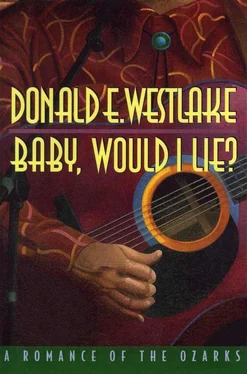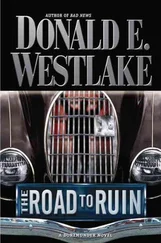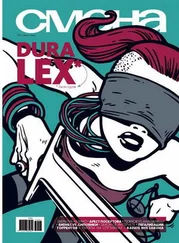“No, no, there’s a red light up here on top, tells you when it’s recording. And these two show lights here come on, or the picture’d be too dark.”
Cal opened another of the Mexican doors, to reveal rows of videotapes, each with pen-and-ink notations on the spine. “Ray saves his tapes,” Cal explained, “in case there’s something good on them he can use later.”
Sara went over to look at the tape boxes. Each was dated in spidery but firm writing, and most included a word or two under the date, probably to indicate what song Ray had been working on that night. A lot of the tapes were marked “IRS,” which must be the song she’d heard him sing on the bus, and which suggested his tax problem had been looming large in his mind for some time now.
Sara said, “Now I get it. I know he said one time, he was sorry he didn’t tape the night of the killing, and I didn’t know what he meant.”
Pointing, Cal said, “Sure. You see? Nothing for July twelfth. And that would have proved he was here instead of out anywhere with Belle or anybody.”
“Well, the prosecutor would say he’d altered the date, wouldn’t he?”
“Then why didn’t he?” Cal asked reasonably, and pointed to another tape, saying, “Just put a one in front of July second.”
“Maybe he should have,” Sara said.
“Too late now,” Cal said, and reached for a tape. “Want to see one?”
“Sure.”
Turning the equipment on, inserting the tape, Cal said, “I’ll play you this one because it’s a song you won’t know.”
“Why not? I’ve been to his show.”
“He’s still working on it; he don’t feel like it’s a hundred percent ready. Well, you’ll see. Sit down there, why don’tcha.”
Sara sat in one of the low well-padded armchairs facing the screen from across the room. Cal started the tape and moved to a similar chair, saying, “Let me know when you had enough.”
“Absolutely.”
Snow. An image. This room, this identical room, but at night. What must be the show lights Cal mentioned made deep shadows in the background, so that the chair Sara was sitting in made a shadow in its screen persona that reached almost all the way back to the door, which was hardly visible at all.
What was mostly visible, standing about halfway between Sara’s chair and the screen, was Ray Jones, in black T-shirt and jeans, barefoot. He’d brought out a dining room chair to put one foot on, with his guitar resting on that raised leg. At first, he didn’t look at the screen at all, but at his fingers working out chords on the guitar. Then he hummed a bit, then he sang a few words, then went back to his guitar work some more.
“Takes him a while to get into it,” Cal said.
“It’s fascinating,” Sara said. And it was. She watched Ray Jones work out notes, chords, progressions, then fit the words into the music, sometimes changing a word, sometimes a note, sometimes merely an emphasis.
After a while, Ray put the guitar down on the chair and went over to the piano, which was barely within camera range and quite poorly lit, so that he almost disappeared when he sat down to play. Four or five minutes, he spent at the piano, and during that time he did no singing, merely tested his melody, altering, changing, changing back, pounding away with varying accompaniments in the left hand. He was an accomplished pianist, which was a surprise to Sara, but with no delicacy of tone; every note came out with the same thudding precision.
After the piano, Ray went back to the chair and the guitar, and for the first time he looked at the camera and acted like a performer. He sang part of the song, a longer and more coherent stretch of it than before, but then broke off and did some more second-guessing. And so on.
When it was all over and done, Sara was astonished to discover she had just spent an hour and five minutes watching that tape. It had all been disjointed and frustrating, one false start after another, but fascinating as well, as she had said to Cal at the beginning, to watch the determination and the knowledge of the man, to watch a workman good at his work doing his work.
It hadn’t been until the very end of the session that Ray had put the chair off to one side, stood flat-footed facing the camera, strummed the guitar, and sang the song all the way through:
There’s rules and regulations,
Worse than the United Nations,
It seems to me that it’s only for fools
To obey those regulations, and those rules.
It’s hard at times to stay within the law;
If I got my freedom, why can’t I be free?
So what’s those rules and regulations for?
They haven’t got a thing to do with me.
I’m speedin down the road at ninety-two.
Though the signs all flashin by say fifty-five;
I want to see what this old car can do.
This car can kill...
someone who was alive.
There’s rules and regulations,
Worse than the United Nations.
It seems to me that it’s only for fools
To obey those regulations, and those rules.
You love ’em, and you leave ’em, that’s the way,
They get a kid, there’s nothin else to do;
You pack your ditty hag one sunny day;
Don’t leave a thing...
except a part of you.
We need these regulations
To hold together all our nation;
You know it’s only greedy men and fools
Who ignore the regulations and the rules.
America’s the greatest land on earth,
The smartest move I made was be born here;
Where every man and woman knows their worth,
A land of hope, and not a land of fear.
At which point, Ray segued into “America! America! God shed his grace on thee, and crown thy good with brotherhood from sea to shining sea.” Then he stopped, and yawned, and said, “Enough.” He walked forward toward the camera, hand reaching out.
The tape went to snow. “Wow,” said Sara. “And he didn’t mention taxes once.”
“Nor murder, neither.” Crossing to the equipment, just as Ray had done, to rewind the tape and shut it all down, Cal said, “That’s gonna be his next release, after the trial.”
“If he’s released, after the trial.”
“Well, yeah,” said Cal.
Leon “The Prick” Caccatorro, chief negotiator for the Internal Revenue Service in its ongoing discussion with Ray Jones as to just how many pounds of flesh he owed Uncle Sam, had borrowed a hive for himself and his team from the U.S. Department of Energy’s offices at the substation at Table Rock Dam. Had Ray cared to, he could look out Leon “The Prick’s” office window and see the spot where he was supposed to have done all those things to Belle Hardwick. But he didn’t care to.
Jolie didn’t care to have him here at all, but he’d insisted. After court let out at 3:40 on Friday afternoon, while Warren and his team went off to show the tape of day one to the shadow jury, Ray took Jolie to one side and said, “Get hold of Leon ‘The Prick.’ I want to meet with him this weekend.”
She reared back, causing seismographs to flutter all over the state. “ You want to meet.”
“This whole thing’s been done arm’s length, Jolie.”
“Damn right.”
“Damn wrong, you ask me. I hate having this damn trial and the IRS hanging over me at the same time. That guy with the sword, who was he?”
Читать дальше







